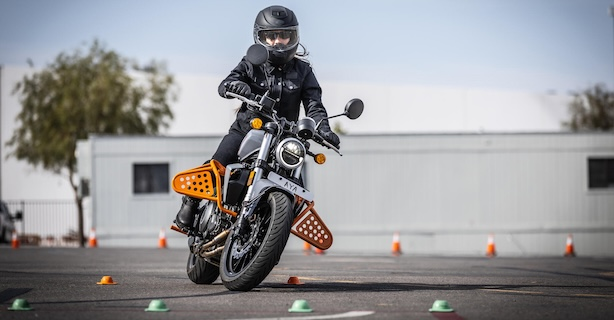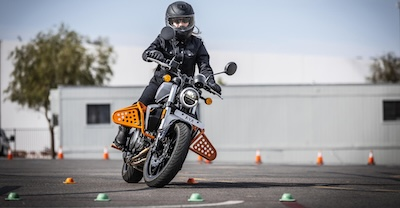Taking a motorcycle safety course is one of the smartest investments you can make as a rider. It equips you with the skills and knowledge to navigate the roads confidently. Whether you're just starting out or you've been riding for years, there's always something new to learn.
Motorcycle riding isn't just a means of getting from A to B - it's an adventure, a passion, and, for many, a way of life. However, the open road comes with its own set of challenges and responsibilities.
Taking a motorcycle safety course is one of the best decisions you can make towards riding safely.
MSF COURSE HISTORY
The Motorcycle Safety Foundation (MSF) has been leading the charge in motorcycle safety since 1973. This means you’re essentially getting decades of experience packed into a course that's designed to prepare you for the street.
You can choose from a range of different courses, depending on your current riding level:
Start Your Ride:
Introductory Motorcycle Experience
DirtBike School
Basic RiderCourse
Basic RiderCourse 3-Wheel
Improve Your Ride:
Basic RiderCourse2 License Waiver
Basic RiderCourse2 Skill Practice
Advance Your Ride:
AdventureBike RiderCourse
Advanced RiderCourse (ARC)
Advanced RiderCourse Skill Practice
The Basic RiderCourse is the most popular option for motorcycle riders looking to get their motorcycle license/endorsement.
WHO SHOULD TAKE A SAFETY COURSE?
Think a basic motorcycle safety course is just for beginners? Think again! Whether you're fresh off your first ride or you've been burning rubber for years, there's always something new to learn.
New riders get a solid foundation, while seasoned bikers can fine-tune their skills and stay updated on the latest safety techniques. So, if you ride, you should consider taking a course. It’s as simple as that.
WHAT YOU'LL LEARN IN A MOTORCYCLE SAFETY COURSE
Here are some of the things you’ll dive into when taking a motorcycle training course.
Improved Riding Skills
From the basic skills of starting and stopping to advanced maneuvers like cornering and emergency braking, a safety course covers all skill levels. You'll learn to handle your bike with precision and grace, making every ride better.
Defensive Driving Techniques
Riding a motorcycle means anticipating the moves of other drivers and staying one step ahead. In a safety course, you'll learn defensive driving techniques that help you spot potential hazards and avoid incidents.
Some of the techniques you may learn include:
Situational awareness - Constantly scanning your surroundings to stay aware of potential hazards.
Safe following distance - Maintaining a safe distance from the vehicle in front of you to allow ample reaction time.
Predictive riding - Anticipating the actions of other drivers, especially at intersections and during lane changes.
Emergency braking - Mastering the technique of braking quickly and safely in unexpected situations.
Avoiding blind spots - Staying out of other vehicles' blind spots and understanding the concept of your own blind spot.
Understanding of Traffic Laws
Traffic laws can be confusing, especially for motorcyclists. A motorcycle safety course breaks it all down for you. You'll learn the specific laws that apply to motorcycles, ensuring you know your rights and responsibilities.
Proper Use of Safety Gear
Helmets, gloves, jackets, boots… they’re not just about looking cool. A safety course teaches you the importance of each piece of gear and how to choose the right ones for different riding conditions.
Increased Confidence
Confidence is key in riding. Knowing you have the skills and knowledge to handle any situation makes you a more assured rider. This confidence translates into better decision-making and a more enjoyable ride. Say goodbye to jitters and hello to smooth cruising!
BENEFITS OF TAKING THE MSF COURSE
Now you know exactly what you’ll learn, let’s take a deeper dive into the benefits of taking an MSF course.
Get Your Endorsement
One of the main benefits of successfully completing an MSF course is getting your motorcycle endorsement. In many states, passing the course means you can skip the riding test, making it a hassle-free way to get that all-important endorsement on your license.
Best For New And Experienced Riders
Whether you're a newbie or a seasoned rider, the MSF course is designed for you. Beginners get the foundational skills they need, while experienced riders can refine their techniques and stay updated on the latest in motorcycle safety.
Improves Motorcyclist Reputation
Motorcyclists don't always have the best reputation. By taking a safety course, you're helping to change that. You become an ambassador for safe, responsible riding. And the more riders who follow suit, the better the reputation for all motorcyclists.
Community Connection
Taking a motorcycle rider training course is more than just learning - it's about community. You'll meet fellow riders, share experiences, and build connections. These bonds can lead to group rides, new friendships, and a support network that enhances your riding experience.
Meet Your State's Legal Requirements
In some states, a motorcycle safety course is a legal requirement for obtaining a motorcycle license.
Reduced Insurance Rates
Want to save money on insurance?
Many insurance providers offer discounts to riders who complete an approved defensive driving or motorcycle safety course. After all, defensive driving courses improve your skills, making you a safer rider and less risky to the insurer. It's a win-win: you become a safer ride, and you save on premiums.
For Harley-Davidson Insurance Services, this covers courses completed within the last five years but does NOT include automobile driving courses unless required by the state.
WHAT TO BRING/WEAR
Ready to take the plunge? Here’s what you need to bring to your motorcycle safety course:
Helmet - DOT-approved for maximum protection.
Gloves - Full-fingered gloves to keep your hands safe.
Jacket and pants - Sturdy, protective clothing like a motorcycle jacket and pants - preferably leather.
Boots - Over-the-ankle boots to protect your feet.
Eye protection - Goggles or a helmet with a visor to keep debris out of your eyes.
Water and snacks - Stay hydrated and energized throughout the day.
WHAT TO DO AFTER YOU'VE COMPLETED A MOTORCYCLE SAFETY COURSE
So, you’ve aced the course. What’s next? Here’s how to keep the momentum going:
Get your endorsement - If required, get that motorcycle endorsement on your license.
Practice, practice, practice - Keep honing those skills to build muscle memory and confidence.
Join a riding group - Connect with other riders for shared experiences and group rides.
Stay updated - Motorcycle safety is always evolving. Stay informed and consider advanced training courses.
DO I NEED TO BUY A MOTORCYCLE BEFORE TAKING A CLASS?
The good news is that you don’t need to have your own motorcycle before taking a class. Motorcycle schools provide motorcycles for proper training, allowing you to learn on a bike suited for beginners. Focus on mastering the skills without the worry of damaging your own bike.
Taking a motorcycle safety course is one of the smartest investments you can make as a rider. It equips you with the skills and knowledge to navigate the roads confidently. Whether you're just starting out or you've been riding for years, there's always something new to learn.
Are you interested in insurance discount options that might be available through Harley-Davidson Insurance Services? Call our licensed advisors, who will personally ensure that you get the best possible value: (800) 462-0406.
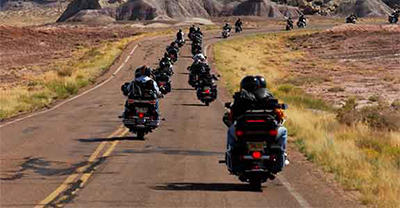
Riding in a group presents special challenges. These basic guidelines and group riding tips can help make sure your next outing is safe and enjoyable for all.
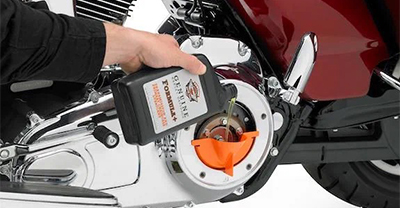
Changing your motorcycle's oil can seem daunting. But with the right tools, knowledge, and patience, you can easily do it yourself with this guide.
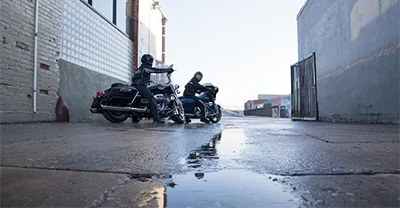
Being on the road when the weather turns wet is all about understanding the needed adjustments. These six wet weather tips will keep the fun going. Learn more!
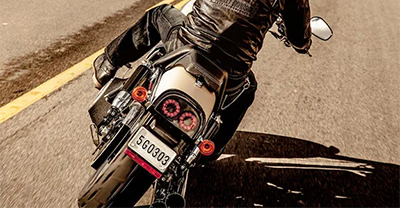
Understanding the principles of countersteering will help you become a rider who’s prepared for any situation. Learn more!

